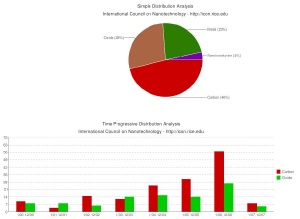Researchers can now do their own analysis of research on the risks of nanomaterials with a new tool unveiled today at the website of the International Council on Nanotechnology (ICON). The database analysis tool can be found at http://icon.rice.edu/report.cfm.

The ICON EHS Database Analysis Tool offers a way for researchers at universities, nongovernmental organizations, government and industry worldwide to analyze ICON’s database of citations to peer-reviewed publications addressing nanomaterials’ environmental, health and safety impacts. The tool enables research comparisons, with every database entry assigned nine indices and each index including a trend across time.
“In addition to returning a list of abstracts that meet criteria chosen by the user, the database now allows the user to analyze research trends across time and by category,” said ICON director and Rice chemist Dr. Kristen Kulinowski. “This provides the user with a much more powerful way to interact with the database’s rich content.”
ICON is an international organization with members from academia, non-governmental organizations, industry and government dedicated to the safe, responsible and beneficial development of nanotechnology. Its EHS database, introduced in 2005, was the first effort to integrate the vast and diverse scientific literature on the impacts of nanoparticles. “The new tool is an important addition to the database,” said Kulinowski. “It is designed to provide a better understanding of the current state of knowledge of risk-relevant research and help identify any gaps in knowledge that need to be addressed in order to support robust risk assessment, management and communication efforts.”
With the newly enabled features, a researcher can:
- Compare categories within a specific time range, e.g., selecting papers published between 2000-2007 and requesting the number that studied nanoscale carbons, oxides, metals and semiconductors.
- Track the progression of publications in a given category by month or year, e.g., plotting the number of publications studying nanoscale carbons and oxides by year or month between 2000 and 2007.
- Generate and export custom reports
- Click on a report result to generate a list of publications meeting user-defined criteria.